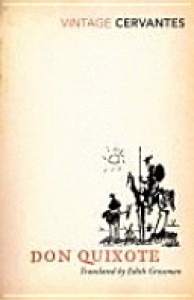Ironic Contradictions
A Knight, His Squire And Plenty Of Jackasses

Don Quixote is undoubtedly a masterpiece, for it is full of so many wonderful literary techniques as well as one of those works of fiction which have survived for centuries. Yet, despite being centuries old, Don Quixote feels fresh and modern, despite being a work that rambles and ambles on Don Quixote feels shorter than it is in passages and longer than it is in others. It is a great book, because we have said that it is a great book, and fascinatingly it is this power in naming something, in calling it out into the open, that is the main point of discussion within Miguel De Cervantes work of fiction.
Don Quixote follows one nobleman, whose original name remains anonymous till the end, who decides to name himself Don Quixote and embark on a journey of knighthood across sixteenth-century Spain. Don Quixote has been inspired by the chivalry of other 'knights errant' that he has read about in such notable tales as those of Guinnevere and Lancelot and believes these chivalrous romances to be true stories. His fabricated histories influence his every move and lead to Don Quixote being the punchline of many jokes and much of the absurd humour of the story. For this is a rather humorous and absurd kind of a novel. Made more absurd by the further characters who join Don Quixote on his journey, particularly Sancho Panza, his squire, who believes that in following Don Quixote he will receive an insula as a reward. Sancho is, in the end, the more relatable character, for where Don Quixote is bound by his beliefs and traditions, the reader observes Sancho develop and grow in his character and his strengths. Of course, Sancho has his own peculiarities, such as misusing a particular word when he might mean to use another.
The writing style of Don Quixote is interesting in its own right and clearly inspired many modernist techniques, particularly those of Jorge Luis Borges. The author claims to have written the story of Don Quixote as a history of Don Quixote and within this history is reference to the history itself. All of which ends up as a peculiar mixture of metafictional techniques and ideas wrapped around each other.
The one big idea within Don Quixote that I took out of it was the connection between fact and fiction. The titular noble character becomes the character of Don Quixote, a fictional character, because he calls himself Don Quixote and proceeds to act as a knight errant. Throughout the rest of the book the importance of names, fictional or otherwise, become revealed to the reader. Don Quixote also has episodes where he believes he is in castles which are inns or experiencing magical adventures which may or may not be fictional (in some cases the reader is told that Don Quixote's narration of those adventures is unreliable). However, the important fact in the novel is that these all become true because they are called and named as truth and more importantly, believed wholeheartedly that they are true. Fiction becomes truth when it is believed in, and the power of naming and believing in anything cannot ever be denied.
As I said earlier, Don Quixote is a novel that is held to be great because we name it as such. Can anyone really read it as anything but a percieved great novel now because of the power in naming it as such? I doubt it, yet it is certainly a fascinating and amusing story on the whole and a highly influential one and for that alone it deserves to be read at least once in your life. Much as with James Joyce's Ulysses.
(For anyone who is interested, the above title is my way of reflecting on the fact that donkeys (or jackasses) appear very regularly throughout Don Quixote. There are also many individuals who act like jackasses in their behaviour towards Don Quixote and his squire.)



 7
7
 4
4
